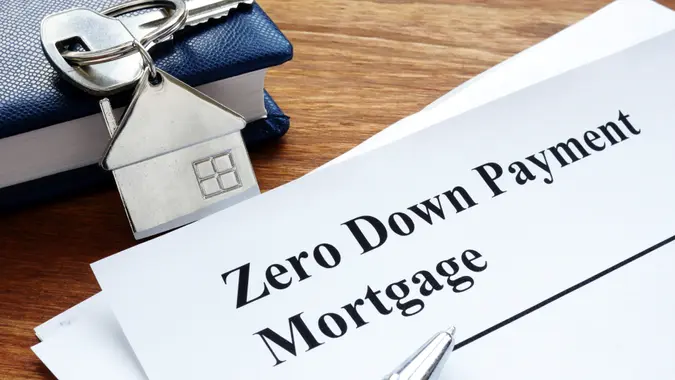10 Reasons My Mortgage Loan Was Rejected

Commitment to Our Readers
GOBankingRates' editorial team is committed to bringing you unbiased reviews and information. We use data-driven methodologies to evaluate financial products and services - our reviews and ratings are not influenced by advertisers. You can read more about our editorial guidelines and our products and services review methodology.

20 Years
Helping You Live Richer

Reviewed
by Experts

Trusted by
Millions of Readers
A mortgage loan application can feel like an IRS audit: tons of paperwork and a thousand questions about your finances. Unfortunately, even when you think you’ve done everything right, you could be one of the 8.3% of applicants who are denied a loan. This can leave you wondering why your mortgage loan was rejected.
GOBankingRates asked mortgage lending experts to run down some of the main reasons applicants get denied so you can find out how to avoid them. Read on to learn more.
1. You Changed Jobs Too Frequently
Lenders like job stability, so you’ll need to stick around for at least two years, according to John Thomas, a branch manager at Primary Residential Mortgage. “We as the bank want to make sure the borrower has the ability and the stability to keep paying the mortgage payment every month, and a job history is one of the best predictors. You don’t have to be at the same job for two years, but there must be a pattern of continuing to work and stability.”
2. You Didn’t Establish Credit
If you have no seasoned, open credit of your own, you might get denied for a mortgage loan even if you’re an authorized user on someone else’s account. If the underwriter determines that the credit report is not an accurate reflection of your credit, “your alternative is to qualify for a manually underwritten home loan,” Thomas said. In that case, you would have to provide alternate sources of credit, and your allowable debt-to-income ratio would be lower.
3. You Paid Debt but Didn’t Erase It
Paying off old debt can actually lower your credit score under older scoring models. This happens if the collection updates to “paid” with the current date instead of the date the collection was last reported. “It’s better to try to pay the collection and negotiate with the debt collection agency to have it removed versus updating the status,” Thomas said. New credit-scoring models, such as FICO 9 and VantageScore 3.0 and 4.0, ignore collections with $0 balances, according to Expedia.
4. Your Home Doesn’t Appraise for the Buying Price
Another reason your mortgage loan was rejected might be because of your home appraisal value. “The home loan is based on a percentage of the appraised value,” Thomas said. “For example, if putting 20% down, the lender is lending you 80% of the purchase price or appraised value, whichever is lower. If the home appraises low, the lender is going to reduce the amount you can borrow.”
You will have three options at this point:
- Pay the difference between purchase price and appraised value in cash at closing.
- Negotiate with the seller to lower the purchase price to the appraised value.
- Walk away.
5. You Have Unpaid Tax Liens or Judgments
You might have forgotten about that old tax lien or judgment, but it’s still out there waiting to haunt your home loan application. “Having an unpaid tax lien or a judgment can cause your mortgage loan application to be rejected and can come up the week before settlement,” Thomas said. “Lenders are required to have a title search done prior to closing, and the title search will find any unpaid federal or state tax liens — as well as any unpaid judgments.” If you don’t have the funds to pay them, the title company won’t be able to issue a clear title policy to the home, and you won’t be able to close on the loan.
6. You Retired Early
Retirement timing could also be why your mortgage loan was rejected. “Many people work very hard to save and retire early but have little income,” said Mark Ferguson, a real estate agent and the founder of InvestFourMore. “Because they have little income, lenders will not want to give them a new loan.”
So what about the retirement accounts you diligently funded during your working years? They only count if the balances are high enough to provide three years’ worth of stable income, according to Chase. Otherwise, they’ll be treated as a depreciating asset.
7. You Opened or Closed a Credit Account at the Wrong Time
Lenders are required to either monitor your credit for new inquiries or pull a new credit report the day before closing, according to Thomas. “A new liability could lower your credit score and make you no longer qualify, or it could increase your debt-to-income ratio, also making you no longer qualified. “Closing credit cards can also cause problems, said Ray Rodriguez, regional mortgages sales manager at TD Bank. “You may think closing a card will help your finances, but in reality, this will reduce your overall available credit, which could negatively impact your credit score.”
8. You Didn’t Use an Acceptable Source for Your Down Payment
Gifts are an acceptable source of down payment money. So some people are turning to crowdsourcing options like GoFundMe accounts to help finance their home purchases, according to Elysia Stobbe, a mortgage marketing coach and author of “How to Get Approved for the Best Mortgage Without Sticking a Fork in Your Eye.” Unfortunately, those crowdsourcing options won’t work. “Money which is gifted has to be from a relative or close family member,” Strobbe said.
9. You Owe Child Support or Alimony
Child support or alimony could impact your mortgage loan approval odds. “Child support and alimony are mandatory monthly expenses, so they are treated the same as a car or credit card payment and are part of the debt-to-income ratio calculation,” according to Casey Fleming, author of “The Loan Guide: How to Get the Best Possible Mortgage.” “Borrowers with extremely high income or no other debt may still qualify,” Fleming said. “However, if your finances are borderline, the child support or alimony payments may knock you out of the running for a housing loan.”
10. You Have Too Many Write-Offs
If you are self-employed, your business deductions could come back to haunt you when you apply for a mortgage. “You write off expenses aggressively to save on taxes, but the lender must use the net income from your tax returns after your business expenses have been deducted,” said Fleming. “If your net income still qualifies for the loan, you’re fine. If not, you may find yourself being a little less aggressive next year.”
Final Take
Getting turned down for a mortgage is disappointing and frustrating, especially when it happens just before your scheduled closing. One way to reduce the risk is to apply for a fully underwritten pre-approval before you start house hunting. That gives you a chance to catch potential issues early, so you can fix them before you make an offer on a home. If it’s too late for that, ask your lender for specific actions you need to take to ensure a better outcome next time around.
FAQ
Here are the answers to some of the most frequently asked questions regarding rejected mortgage loan applications.- What are the main reasons for mortgage denial?
- Here are some common reasons for a mortgage denial:
- You changed jobs too frequently
- You didn't establish credit
- You paid debt but didn't erase it
- Your home doesn't appraise for the buying price
- You have unpaid tax liens or judgments
- You opened or closed a credit account at the wrong time
- You retired early
- You didn't use an acceptable source for your down payment
- You owe child support or alimony
- You have too many write-offs
- Here are some common reasons for a mortgage denial:
- What do I do if my mortgage loan is denied?
- If your mortgage loan was denied, you should first call the lender to find out why. Sometimes you can provide clarification or extra details and the paperwork can be updated. If your credit was the reason you got denied, you should review your report. Take the necessary steps to boost your score. From there, you can wait and reapply.
- How common is a declined mortgage?
- According to a 2022 report from the Consumer Finance Protection Bureau, 8.3% of mortgage loan applicants are denied.
- Why won’t mortgage companies approve your application?
- There are many reasons why mortgage companies would deny your application. A few would be if you changed jobs too frequently, you didn't establish credit or you didn’t use an acceptable source for your down payment.
Daria Uhlig contributed to the reporting for this article.
Our in-house research team and on-site financial experts work together to create content that’s accurate, impartial, and up to date. We fact-check every single statistic, quote and fact using trusted primary resources to make sure the information we provide is correct. You can learn more about GOBankingRates’ processes and standards in our editorial policy.
- Consumer Financial Protection Bureau. 2022. "Data Point: 2021 Mortgage Market Activity and Trends."
- Chase. "What to do if your mortgage application gets denied."
- Chase. "Buying a home after retirement."
 Written by
Written by  Edited by
Edited by 

























